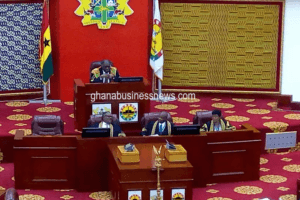MPs propose recycling plants and increase in VAT for sanitation
 Some Members of Parliament (MPs) have agreed that recycling plants should be built across all the 16 regions of Ghana, and the Value Added Tax (VAT) be increased, to address the nation’s sanitation problems.
Some Members of Parliament (MPs) have agreed that recycling plants should be built across all the 16 regions of Ghana, and the Value Added Tax (VAT) be increased, to address the nation’s sanitation problems.
Despite efforts by the government to improve Ghana’s poor sanitation rating, it is reportedly losing about $290 million annually to poor sanitation across the country, according to a study done by the Water and Sanitation Programme of the World Bank.
According to the study, the amount is equivalent to $12 per person per year in Ghana, which translated to 1.6 per cent of the national Gross Domestic Product (GDP).
On Wednesday, some MPs serving on the Joint Select Committees, Local Government and Rural Development, Works & Housing and Environment, Science, Technology and Innovation threw their weight on calls on the government, to replicate the recycling plant of the Integrated Recycling and Compost Plant Limited and the Sewage Systems Ghana Limited in Accra, in all the 16 regions of the country, with the necessary support as means of improving sanitation countrywide.
The suggestion was made during a tour by the MPs to some sanitation and sewerage facilities in Accra, by the joint select committee. The places visited were the Sewerage Systems Ghana Limited, the Integrated Recycling, the Accra Compost and Recyling Plant at Adjen Kotoku, the Kpone Landfill Site and the Jekora Compost Plant at Borteyman, both near Tema.
The Committee members toured the facilities to ascertain how best the country could address its sanitation challenges, especially, the kind of support the government could give to captains of industry in the private sector.
“All landfill sites, something happens underground where you dump the waste. We don’t want to have all these things. Maybe in 50 to 60 years’ time, all our lands will be taken by landfill sites. The population is increasing, 2.5 per cent annually and we need to come out with ideas that can resolve our sanitation problems and these are some of the things that all of us must come together to push,” Mr Yaw Addo Frimpong, Chairman of the Parliamentary Select Committee on Environment, Science, Technology and Innovation and MP for Manso Adubia said during the tour.
He added, “I am proposing that if we add some small percentage on the VAT for sanitation, I don’t think any Ghanaian will kick against that idea. This is something that we will have national consensus so that everybody will come to agree with us that, sanitation is key and we are able to resolve it, everybody will be happy.”
Mr Frimpong was hopeful that the suggestion to build more recycling plants, increase in VAT rates for sanitation and strict enforcement of sanitation rules will work ‘magic’ for the country.
Nii Lante Vanderpuje, Ranking Member of the Local Government Committee and MP for Odododiodioo Constituency praised the establishment of the recycling plants, but called for more government support, as their Internally Generated Fund (IGF) could not cover the full cost of operations.
Ms Betty Brown, General Manager of the Integrated Recycling and Compost Plant Limited and the Sewage Systems Ghana Limited, in Accra, said rates charged by government institutions for the lifting of their waste were heavily subsidised. She appealed to government institutions, to pay economic rates to the recycling plant.
At Adjen Kotoku, the MPs committee learnt that compost plants export waste to Turkey for the manufacture of jerseys, and it was announced there were plans to increase its capacity from 600 tonnes daily to about 2000 by next year November.
The MPs expressed worry that smoke was billowing and swarming the mountainous Kpone Landfill Site near Tema, which exploded last August and called for immediate shut down of the site to prevent possible environmental catastrophe and cardiovascular problems for residents in communities near the site.
Source: GNA
